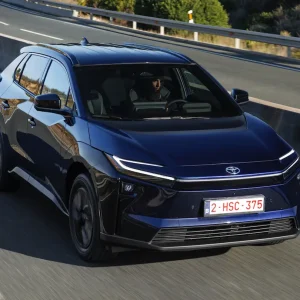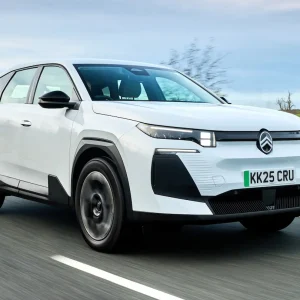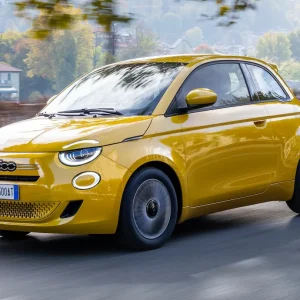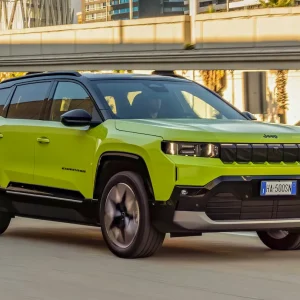Cupra must have been happy with last year’s launch of the Born EV – despite its delayed release. We’re certainly seeing plenty of Born drivers on UK roads, who like us, appreciate the Volkswagen ID.3-based Born’s toughened looks, more premium feel to the interior and keener drive. 58kWh versions with 201hp and a theoretical range of 260 miles were available at launch and we continue to run one on our long-term fleet (see P45 for the latest report). However, in the summer of last year, Cupra added range-topping 77kWh versions. So, we took a top spec V3 for a drive to see how it compared to our 58kWh car, also in V3 trim.
Outside, we couldn’t spot any differences from this 77kWh car to our 58kWh car, other than the rich, optional Raleigh Red metallic finish (£590), that we felt really suited this Born. So, think the same hardened ID.3, with its own LED headlights, aggressive front air dam with copper highlights that are a feature of the exterior and interior, plus a smaller, concaved grille with CUPRA spelt out.
Like our V3, the wheels are the same 20in size and ‘Hurricane’ style, plus the same chunkier side skirts with their neat little fins. While at the back of this Cupra EV, there are unique LED lights, a bigger rear spoiler, and a distinctive lower diffuser.
Inside, again the interior feel and architecture is unchanged from the standard Born. So, think more premium feeling plastics, copper highlights and granite grey Dinamica trim for the seats, which are the heated, massaging, single-piece sports type at the front. In fact, the only change we could spot over our car came from the optional £775 tech pack, which includes a welcome wireless phone charger – that really should be standard – and illuminated door handles on the outside, which are useful in the dark. But, other than the bigger battery, it’s hard to see where the extra £4,500 for the 77kWh test car has gone.
Elsewhere, rear space remains excellent, with the same airy feel thanks to the tall body and large windows. Plus, the boot is practical with 385 litres of space – that’s expandable by folding the seats.
The big changes happen underneath the familiar body, as the 77kWh e-Boost boasts 228hp, 310Nm of torque, with a 0-62mph acceleration time of seven seconds, although the E-Boost version of the smaller 58kWh model is quicker at 6.6 seconds – a result of the 77kWh models’ heavier battery.
Of most interest to us is the range, as despite the claimed 260 miles of our long-term car, we have never bettered 220 miles. The claimed range for the 77kWh e-Boost is 335 miles, although on a 430-mile round trip to Yorkshire while we had this car, we saw around 280 miles to a charge. So better than our Born, but not significantly so.
The Born is compatible with both AC and DC charging networks, and customers can add 62 miles (100km) of range in as little as seven minutes, using a 135kW charging point on 77kWh battery versions. The battery can be recharged from 5% to 80% in as little as 36 minutes (135kW).
The extra weight has had a negative effect on the performance, ride and handling, too. Speed might build quickly, but it doesn’t feel as willing as our 58kWh Born from the off – even with the steering wheel-mounted E-Boost button that is supposed to deliver an extra surge of power. Our car feels noticeably lighter and more nimble and less affected by the weight at low speeds than this 77kWh car. On the road, it’s still fun, but it’s not as engaging or as comfortable and composed when the tarmac gets twistier.
This is on top of the brakes, that could still do with more feel and modulation. Plus, the Volkswagen-supplied infotainment system should really be better at this price point. Despite these issues, the Born remains one of the most fun-to-drive EVs around, with the same sophisticated, sporty feel. However, the extra range has come at the expense of some of the keen drive. Could the E-Boost version of the 58kWh version be the sweet spot in the Born range? We’ll try to find out later.
Cupra Born 77kWH V3
P11D: £43,680
Residual value: 51.14%
Depreciation: £21,340
Fuel: £4,579
Service, maintenance and repair: £2,095
Cost per mile: 46.69p
Range: 335 miles
CO2 (BIK %): 0g/km (2%)
BIK 20/40% a month: £14/£29
Luggage capacity: 385 litres
Engine size/power: 77kWh/228hp





